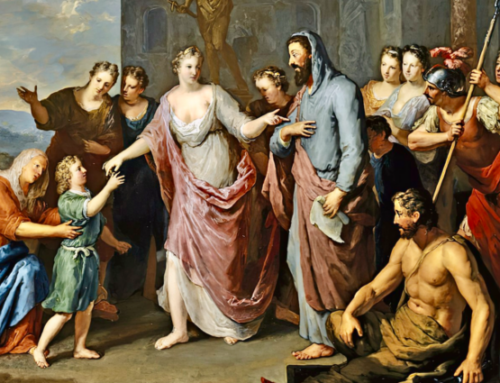C.S. Lewis’s “Mere Christianity” is a model work in the muddled and subjective world of ideologies, state-led terrorisms, gulags, holocausts, and killing fields. Sprinkled with timeless wisdom and profound insights, it is about fundamental aspects of Christianity and seeks to go beyond denominational differences without creating yet another new denomination.
 After C.S. Lewis converted to Christianity in late 1931, he threw himself—not surprisingly—into the subject, immersing himself in theological arguments, but as understood by a lay person, himself. He came to believe, rather fervently, that when a person discovers his error in something, he could not merely apologize and continue moving forward. Rather, he must return to the point of his journey where and when he initially had gone wrong and begin again, taking the right path this time. Sometimes, morality demands action. At other times, though, it demands restraint.[1]
After C.S. Lewis converted to Christianity in late 1931, he threw himself—not surprisingly—into the subject, immersing himself in theological arguments, but as understood by a lay person, himself. He came to believe, rather fervently, that when a person discovers his error in something, he could not merely apologize and continue moving forward. Rather, he must return to the point of his journey where and when he initially had gone wrong and begin again, taking the right path this time. Sometimes, morality demands action. At other times, though, it demands restraint.[1]
But progress means getting nearer to the place where you want to be. And if you have taken a wrong turning, then to go forward does not get you any nearer. If you are on the wrong road, progress means doing an about-turn and walking back to the right road; and in that case the man who turns back soonest is the most progressive man. We have all seen this when doing arithmetic. When I have started a sum the wrong way, the sooner I admit this and go back and start again, the faster I shall get on. There is nothing progressive about being pig headed and refusing to admit a mistake. And I think if you look at the present state of the world, it is pretty plain that humanity has been making some big mistake. We are on the wrong road. And if that is so, we must go back. Going back is the quickest way on.[2]
For Lewis, as he believed it, his original wrong turn had been deep in his past, especially as he had begun to explore philosophy and rationality, prior to Oxford. While one might expect Lewis to go back even further, to return, for example, to the days prior to his love of all things northern and pagan, he did no such thing. The paganism, no matter how flawed, he fiercely argued, had pointed him in the right direction—that is, toward Christianity, rather than away from it. Paganism had embraced the appearance of Christianity in its various stories, modes, expressions, and myths, but it had failed to understand the essence of Christianity and, thus, had to be fulfilled by Christianity itself. God “sent the human race what I call good dreams: I mean those queer stories scattered all through the heathen religions about a god who dies and comes to life again and, by his death, has somehow given new life to men.”[3] The real error in Lewis’s life, then, had come in his philosophical inquiries and, therefore, he found the need to approach Christianity from its most basic foundations, its “mere Christianity.” From a personal perspective, his journey returned to young adulthood. From the Christian perspective, though, he began at the beginning, thus building a fundamental understanding of the principles and tenets of Christianity for himself and for his reading public.
Throughout the 1930s, Lewis continued to work diligently on scholarly and academic books and articles, but he also began to record and analyze his mere Christianity in a flood of more popular articles, books, and radio addresses. His first such book was the curious philosophical/theological Problem of Pain, dedicated to the Inklings. Soon after this, however, Lewis wrote a flurry of theological articles, some for a popular audience and some for a specialized audience. World War II, begun in September 1939, only accelerated the speed of Lewis’s pen, and one might rightly consider the war years to have been the highpoint of Lewis’s Christian writing. Add to this that the military and the BBC approached Lewis, asking him to be the voice of British Christianity, and Lewis’s reputation as a great champion of Britain became assured. Perhaps only Winston Churchill’s voice rivaled and bested that of Lewis during the war. Lewis’s finest books of the period—Broadcast Talks (1942), Christian Behaviour (1943), and Beyond Personality (1944)—all came from his radio addresses and, taken together, comprised his best non-fiction work, Mere Christianity (1952).
By almost any criteria, Mere Christianity is a tour de force, a model work in the muddled and subjective world of ideologies, state-led terrorisms, gulags, holocausts, and killing fields. Not only is it sprinkled with timeless wisdom and profound insights, but also it is always remarkably charitable when it comes to the myriad divisions within Christianity. Thus, it is not “mere” simply because it is about fundamental aspects of Christianity, but it is also “mere” because it seeks to go beyond denominational differences without creating yet another new denomination. Lewis chastised those who would promote the scandal of a divided Christianity, while fully admitting that he considered himself—for the sake of full disclosure to his audience—a member of the Church of England, “not especially ‘high,’ nor especially ‘low,’ nor anything else” except for a deep admirer of the Book of Common Prayer.[4] Yet, Lewis assured his readers, he would not be taking a specifically Anglican view on anything. To do so would only further promote division. “Our divisions should never be discussed except in the presence of those who have already come to believe that there is one God and that Jesus Christ is His only Son,” Lewis claimed.[5] Taking his image from the New Testament, Lewis considered Christianity to be one house, his book the common hallway that connected a number of different denominations. They would not, throughout the book, be entering any single room, but would “obey the rules which are common to the whole house.”[6]
Lewis begins Mere Christianity by appealing to the natural law or what he termed the “Law of Human Nature.”[7] Laws of Nature, Lewis noted specifically, could not actually be violated, as they were physical laws, such as the law of gravity or that the sun rises or sets based on the mechanics of the solar system. The Law of Human Nature, however, enters the realm of ethics and morality, freely chosen or ignored by every human being, even though the laws understand absolutes of right and wrong. “If a thing is free to be good,” he writes, “it is also free to be bad.”[8] As Lewis had explained in great detail in The Abolition of Man, Laws of Human Nature tend to be universal in importance as well as in application.
I know that some people say the idea of a Law of Nature or decent behaviour known to all men is unsound, because different civilisations and different ages have had quite different moralities. But this is not true. There have been differences between their moralities, but these have never amounted to anything like a total difference. If anyone will take the trouble to compare the moral teaching of, say, the ancient Egyptians, Babylonians, Hindus, Chinese, Greeks and Romans, what will really strike him will be how very like they are to each other and to our own.[9]
These laws were universal in their positive as well as their negative application. No culture at any time, for example, had ever embraced selfishness as a good.[10] Again, it must be stressed, there are absolutes of right and wrong, though we often—through error or intent—chose the wrong. Consequently, human beings in general do “believe that some moralities are better than others.”[11] And far from being soft and flexible—however much we might justify our errors—“there is nothing indulgent about the Moral Law. It is as hard as nails.”[12]
None of this should suggest that Lewis saw an unrelenting conformity in, within, and across cultures. To the contrary, Lewis proclaimed cultures to be uneven and reality strange and complicated, and rarely what one might first expect.[13] There are those, he recognized, who hold a materialist view of the world and those who hold a religious view of the world. The materialists look everywhere for chance, and the religious look everywhere for purpose. There are numerous divisions within the latter.
The first big division of humanity is into the majority, who believe in some kind of God or gods, and the minority who do not. On this point, Christianity lines up with the majority—lines up with ancient Greeks and Romans, modern savages, Stoics, Platonists, Hindus, Mohammedans, etc., against the modern Western European materialist.[14]
Of all rivals to Christianity—which Lewis labels “a fighting religion”—Lewis finds the “manliest” to be Dualism. Yet, Dualism suffers from one grand and fatal flaw: It believes that good and evil are equal. Good, Lewis stresses, is a thing in and of itself while evil is merely and always a perversion of the good.[15] Thus, good is real, while evil is a shadow of the real.
To be bad, he must exist and have intelligence and will. But existence, intelligence and will are in themselves good. Therefore he must be getting them from the Good Power: even to be bad he must borrow or steal from his opponent. And do you now begin to see why Christianity has always said that the devil is a fallen angel? That is not a mere story for the children. It is a real recognition of the fact that evil is a parasite, not an original thing. The powers which enable evil to carry on are powers given it by goodness. All the things which enable a bad man to be effectively bad are in themselves good things—resolution, cleverness, good looks, existence itself.[16]
Christianity and Dualism each understand that a war rages in the cosmos. But, for Christianity, evil is always and everywhere a lessening of good, whereas Dualism assumes them to be equal and opposites. Christianity, therefore, believes the struggle to be “a civil war, a rebellion, and that we are living in a part of the universe occupied by the rebel.”[17] Paradoxically, our choice to choose evil is also what makes our choice to choose good so profoundly beautiful. “Free will, though it makes evil possible, is also the only thing that makes possible any love or goodness or joy worth having,” he believes.[18] While men throughout history have chosen horrible things, they have also chosen—through their free will—to convert empires and to abolish slavery.[19] They have, through free will, done the best and the worst. As such, every decision—for good or ill—matters.
With his free will, the devil rebelled against God, wanting to create a world without end for himself as the head of all things. In his fall—his rebellion—he persuaded the first man and woman to strive to be as gods, that is, to pursue a destiny beyond and around God. As Lewis reminded his readers, the greater the free will, the greater the good and the greater the evil. Men, in their folly, pursue that which they believe will make them happy, whereas the only true happiness resides in God Himself, through His freely given grace.
What Satan put into the heads of our remote ancestors was the idea that they could ‘be like gods’—could set up on their own as if they had created themselves—be their own masters—invent some sort of happiness for themselves outside God, apart from God. And out of that hopeless attempt has come nearly all that we call human history—money, poverty, ambition, war, prostitution, classes, empires, slavery—the long terrible story of man trying to find something other than God which will make him happy.[20]
Only from and through God can humanity truly attain happiness.
The human person, by his very nature, is meant to pursue grace. All of human history, then, has seen the attempt to create greatness and happiness, over and over again, only to see commensurate falls. Men, therefore, are in rebellion as well, and, to be forgiven, they must not only accept a ceasefire, but they must also lay down their arms and apologize, returning to the point of their error, and begin again.
Now repentance is no fun at all. It is something much harder than merely eating humble pie. It means unlearning all the self-conceit and self-will that we have been training ourselves into for thousands of years. It means killing part of yourself, undergoing a kind of death. In fact, it needs a good man to repent. And here comes the catch. Only a bad person needs to repent: only a good person can repent perfectly.[21]
Jesus Christ—being fully man and fully God—is the only being in the entirety of the cosmos, time, and space, who can offer the perfect repentance. “Perfect because He was God,” Lewis explained, “surrender and humiliation because He was man.”[22] Further, one must recognize that man shares both the spiritual and physical elements of Jesus Christ. God has nothing against the material, having been the Author of it. One should, therefore, never be too spiritual nor too physical, but must strive to find a balance between both.
There is no good trying to be more spiritual than God. God never meant man to be a purely spiritual creature. That is why He uses material things like bread and wine to put the new life into us. We may think this rather crude and unspiritual. God does not: He invented eating. He likes matter. He invented it.[23]
Real human progression, then, comes from acceptance of the repentance offered by Jesus and attempting to be a little Jesus oneself. If there is evolution, it is toward Christ and becoming more like His image. Perhaps most importantly for Lewis, one must recognize that Jesus was God, not merely a moral teacher.
I am trying here to prevent anyone saying the really foolish thing that people often say about Him: ‘I’m ready to accept Jesus as a great moral teacher, but I don’t accept His claim to be God.’ That is the one thing we must not say. A man who was merely a man and said the sort of things Jesus said would not be a great moral teacher. He would either be a lunatic—on a level with the man who says he is a poached egg—or else he would be the Devil of Hell. You must make your choice. Either this man was, and is, the Son of God: or else a madman or something worse.[24]
And yet Jesus was a moral teacher, too. Like all great teachers, He reminded His followers of what was always true, rather than inventing an entirely new morality. “Really great moral teachers never do introduce new moralities,” Lewis stated. “It is quacks and cranks who do that.”[25] The true teacher brings his students back to first principles and right reason. With morality and grace enabling the person to choose wisely and rightly, he becomes, in his own way, the center of all creation.
If individuals live only seventy years, then a state, or a nation, or a civilisation, which may last for a thousand years, is more important than an individual. But if Christianity is true, then the individual is not only more important but incomparably more important, for he is everlasting and the life of a state or a civilisation, compared with his, is only a moment.[26]
With every choice at every moment, man either becomes more Godlike or more devillike.[27]
In our temptation to be like Gods, Lewis knew, man engages the first sin, pride, repeatedly. All other sins pale in comparison.
The vice I am talking of is Pride or Self-Conceit: and the virtue opposite to it, in Christian morals, is called Humility. You may remember, when I was talking about sexual morality, I warned you that the centre of Christian morals did not lie there. Well, now, we have come to the centre. According to Christian teachers, the essential vice, the utmost evil, is Pride. Unchastity, anger, greed, drunkenness, and all that, are mere fleabites in comparison: it was through Pride that the devil became the devil: Pride leads to every other vice: it is the complete anti-God state of mind.[28]
Pride, Lewis argued, always seeks power to remake the world in the image of someone rather than in the humility of Christ, and it results in most of the miseries of this world. Many sins, Lewis claimed, will actually create forms of community, but pride always leads to conflict between men and men and between God and His creation. “For Pride is spiritual cancer,” he continued, “it eats up the very possibility of love, or contentment, or even common sense.”[29]
It must be remembered, however, as Lewis stressed again and again, that one need not choose evil. Accepting grace, he will also choose to do the right thing, to engage and accept the moral law, to treat his fellow humans with dignity, and to love all other individual persons as made in the image of Christ. Yet, for men to choose good—which has consequences that can change the very trajectory of eternity—they should be reminded, as often as possible and through as many means as possible that good can and should be accomplished in this fallen world. Given the vast importance of every decision one makes, the Christian God, unlike other gods in other religions, Lewis argued, is “a dynamic, pulsating activity, a life, almost a kind of drama… a kind of dance.”[30] In this dance—a dance of love—we recognize that Jesus Christ, as the Second Person of the Trinity, is the Son of God.
If we share in this kind of life we also shall be sons of God. We shall love the Father as He does and the Holy Ghost will arise in us. He came to this world and became a man in order to spread to other men the kind of life He has—by what I call ‘good infection’. Every Christian is to become a little Christ. The whole purpose of becoming a Christian is simply nothing else.[31]
Again, through God’s grace and our free will and outrageously hard work, we become either heavenly beings—that is, gods and goddesses—or we become, through pride and our free will and sloth, demons, absent of reality, truth, and goodness. “How monotonously alike all the great tyrants and conquerors have been: how gloriously different are the saints,” Lewis concluded.[32]
The Imaginative Conservative applies the principle of appreciation to the discussion of culture and politics—we approach dialogue with magnanimity rather than with mere civility. Will you help us remain a refreshing oasis in the increasingly contentious arena of modern discourse? Please consider donating now.
Notes:
[1] C.S. Lewis, Mere Christianity (1952; New York: HarperOne, 2000), 100.
[2] CSL, Mere Christianity, 28, 101. Lewis repeated this thought in several of his many writings. It serves as one of the most important Lewisian themes.
[3] Ibid., 50.
[4] Ibid., viii, x.
[5] Ibid., viii.
[6] Ibid., xvi.
[7] Ibid., 4.
[8] Ibid., 48.
[9] Ibid., 5.
[10] Ibid., 6.
[11] Ibid., 13.
[12] Ibid., 30.
[13] Ibid., 41.
[14] Ibid., 35.
[15] Ibid., 44.
[16] Ibid., 45.
[17] Ibid.
[18] Ibid., 48.
[19] Ibid., 134.
[20] Ibid., 49.
[21] Ibid., 56.
[22] Ibid., 60.
[23] Ibid., 64, 98, 102.
[24] Ibid., 52.
[25] Ibid., 82.
[26] Ibid., 74.
[27] Ibid., 92.
[28] Ibid., 121.
[29] Ibid., 125.
[30] Ibid., 175.
[31] Ibid., 177.
[32] Ibid., 226.
The featured image is courtesy of Pixabay.







Wow, wow, wow, an unspeakable beautifully written essay from the core of what Christianity is about in practice. Love every word!
Maria, I can’t tell you how much your comment means to me. This is from a much longer work (a book) on the Inklings, and I try to maintain this tone throughout. So,, if I get your approval, my heart is happy! I’ve been worried that I’ve been too dry in my writing. Yours, Brad
A wonderful article, thank you kindly sir for writing such a quality piece.
Thanks, Ayden! Really much appreciated! Glad to have your approval!
Excellent article and very refreshing. I am a huge Lewis fan but I have lately been hanging out with a lot of “Reformed” brethren who, while very steeped in Scripture, do not accept anyone who is not 100% down the line with their thought(s). Therefore the whole idea of “Mere Christianity” is anathema to them. Thanks for the reminder of what a great work this is and why Lewis wrote it!
Dear Sam, thank you so much for your good thoughts and your kind words. Believe me, such skepticism is in every aspect of the faith–especially in my Roman Catholic brethren. Lewis, though, knew that he would encounter such opposition. I think his emphasis on us doing good (which so many interpret–I think, incorrectly–as works) is a real stumbling block. From my perspective, Lewis meant align our will with His will. Anyway, I’m honored by your thoughts and your post. Thank you, Brad